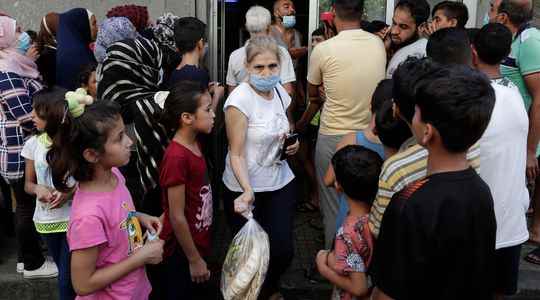The day after the Russian invasion of Ukraine, on February 24, Ghada, a 60-year-old former Lebanese teacher, began to fill her two freezers with bags of bread, “by reflex”, “as if the time of the Lebanese civil war”, fearing the shortages to come. For five weeks, this war several thousand kilometers from the Middle East has shaken food security in the region and more particularly in Lebanon, a country that has been going through the worst political and economic crisis in its history. According to a note published in mid-March by the World Bank, the Cedar country, which imports more than 90% of its cereals from Ukraine and Russia, only has reserves for about a month. During an official tour of Italy on March 22, President Michel Aoun implored the UN to increase its food aid. However, to hear local politicians, the situation does not seem “alarming”, the Lebanese having, as usual, recourse to the D system.
One thing is certain: the country, already out of breath, is not in a position to withstand a new shock. According to figures from the Central Administration of Statistics, food price inflation reached 3,328.6% between September 2019 and January 2022, and the national currency lost more than 90% of its value against the dollar. . While almost all wheat imports, subsidized by the Central Bank since 2019, have disappeared since the start of the Ukrainian crisis, Lebanon is now facing several problems. He must first turn quickly to other producing countries, not too far away so as not to have to pay significant transport costs. However, many countries fear that Lebanon, bankrupt, will not be able to pay the bill.
Calls for help
The second challenge concerns the logistical conditions for storing these foodstuffs. The silos – making it possible to keep more than 120,000 tonnes of grain reserves – having been destroyed during the explosions at the port of Beirut on August 4, 2020, the wheat is currently stored in the port of Tripoli (North) as well as in buildings held by millers. “Everything is under his control, assures L’Express Gerges Berberi, director general of grain and sugar beet stocks, an organization attached to the Ministry of the Economy. “We manage as best we can to bring in wheat from other country. And despite the rise in prices, bakeries continue to operate,” he notes.
Riad Saadé does not share this optimism. The director of the Lebanese Agricultural Research and Studies Center has been warning for years about the risk of shortages and the lack of state awareness to put in place a long-term plan. According to him, only the very effective Lebanese charity network explains that “we do not yet feel the crisis”, and that the situation does not cause any scene of panic. Charbel, manager of a manouché oven – a sort of pancake with thyme or cheese – brushes aside what he calls “rumors”: “I don’t think we’re going to put the key under the door, he said. At worst, we will have to increase our rates a little…”
However, he recognizes, “like everyone”, already facing restrictions. “If I order six 50-kilogram bags of flour, I only receive four, which forces me to turn to other suppliers.”
